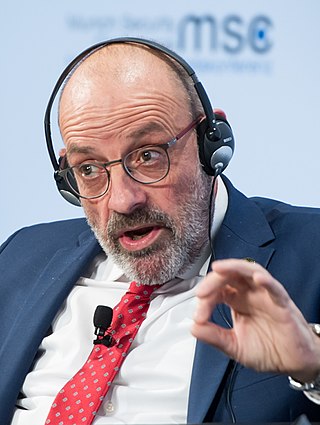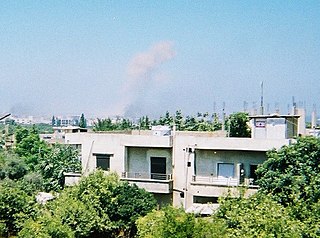| |||||
| Decades: | |||||
|---|---|---|---|---|---|
| See also: | |||||
The following lists events that happened in 2007 in Lebanon .
| |||||
| Decades: | |||||
|---|---|---|---|---|---|
| See also: | |||||
The following lists events that happened in 2007 in Lebanon .

The history of Lebanon covers the history of the modern Republic of Lebanon and the earlier emergence of Greater Lebanon under the French Mandate for Syria and the Lebanon, as well as the previous history of the region, covered by the modern state.

Michel Naim Aoun is a Lebanese politician and former general who served as the 13th President of Lebanon from 31 October 2016 to 30 October 2022.
Jund al-Sham is or was the name of multiple Sunni Islamist jihadist militant groups.

The Lebanese Forces is a Lebanese Christian-based political party and former militia during the Lebanese Civil War. It currently holds 19 of the 128 seats in Lebanon's parliament, being the largest party of the country.

Fouad Siniora is a Lebanese politician, a former Prime Minister of Lebanon, a position he held from 19 July 2005 to 25 May 2008. He stepped down on 9 November 2009 in favor of Saad Hariri, the late Rafik Hariri's son. He is the leader of the parliamentary group of the Future Movement.

Since 2004, a series of bombings and assassinations have struck Lebanon, most of them occurring in and around the capital, Beirut. This wave of bombings began with the assassination attempt on Marwan Hamadeh, then peaked with the assassination of former Prime Minister Rafic Hariri on 14 February 2005, which touched off the Cedar Revolution and the withdrawal of Syrian troops. After the massive protests sparked by Hariri's killing, several more bombings hit Lebanon.

Marwan Hamadeh is a Lebanese journalist and politician, who served in various capacities in different cabinets, including minister of education, minister of telecommunications, minister of economy and trade, minister of tourism, minister of health and minister for the displaced. He served as a member of the Lebanese parliament until his resignation, on 5 August 2020, after the explosions in Beirut claiming that the government was "ineffective" to handle the incident.

Yacoub Riad Sarraf is a Lebanese politician. He was born in the town of Miniara in the Akkar district of northern Lebanon.

Pierre Amine Gemayel was a Lebanese politician in the Kataeb Party, also known as the Phalange Party in English.

The 2006–2008 Lebanese protests were a series of political protests and sit-ins in Lebanon that began on 1 December 2006, led by groups that opposed the US and Saudi-backed government of Prime Minister Fouad Siniora and ended on 21 May 2008 with the signing of the Doha Agreement. The opposition was made up of Hezbollah, Amal, and the Free Patriotic Movement (FPM); a number of smaller parties were also involved, including the Marada party, the Lebanese Communist Party and the Syrian Social Nationalist Party. A majority of the members of the government were part of the anti-Syrian March 14 Alliance, a coalition of political parties and independents in Lebanon. The two groups were also divided along religious lines, with most Sunnis and Druze supporting the government, and most Shi'a supporting the opposition. The Christian community was split between the two factions, with Michel Aoun, the leader of the FPM, claiming to have more than 70% support among the Christians, based on the results of the 2005 parliamentary election.
The 2007 Bikfaya bombings were two blasts on buses near Bikfaya, Lebanon which killed three people and injured 21 others. The bombings heightened tensions in the country following the Cedar Revolution, and on the eve of the two-year anniversary of the assassination of Rafic Hariri.

Nahr al-Bared is a Palestinian refugee camp in northern Lebanon, 16 km from the city of Tripoli. Some 30,000 displaced Palestinians and their descendants live in and around the camp, which was named after the river that runs south of the camp. Under the terms of the 1969 Cairo Agreement, the Lebanese Army does not conventionally enter the Palestinian camps, and internal security is provided by Palestinian factions.

Fatah al-Islam is a Sunni Islamist militant group established in November 2006 in a Palestinian refugee camp, located in Lebanon. It has been described as a militant jihadist movement that draws inspiration from al-Qaeda. It became well known in 2007 after engaging in combat against the Lebanese Army in the Nahr al-Bared UNRWA Palestinian refugee camp. Following its defeat at Nahr el-Bared, the group relocated to the Ain al-Hilweh refugee camp near Sidon in 2008. As of 2014, after the death or capture of many members, most of the surviving members of Fatah al-Islam are thought to have joined other groups in Lebanon and Syria including the Free Syrian Army, Al-Nusra Front, Ahrar al-Sham, and the Islamic State of Iraq and the Levant.

The 2007 Lebanon conflict began when fighting broke out between Fatah al-Islam, an Islamist militant organization, and the Lebanese Armed Forces (LAF) on May 20, 2007 in Nahr al-Bared, a UNRWA Palestinian refugee camp near Tripoli.

This is a detailed timeline of the 2007 Lebanon conflict.

The 2008 Lebanon conflict was a brief intrastate military conflict in May 2008 in Lebanon between opposition militias and pro-government Sunnis. After the 18-month-long political crisis spiralled out of control, with the government's decision to dismantle Hezbollah's telecommunication system, Hezbollah seized control of majority Sunni neighorhoods in west Beirut. The conflict ended with the adoption of the Doha Accord in 2008.

Bachir Pierre Gemayel was a Lebanese militia commander who led the Lebanese Forces, the military wing of the Kataeb Party, in the Lebanese Civil War and was elected President of Lebanon in 1982.
The following lists events in the year 2017 in Lebanon.